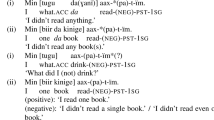Abstract
The topic of the following article is an exceptional use of the negative quantifier nothing and its correspondents in German, Dutch and Italian in which this element turns out to act like a negative polarity item (NPI). The circumstances under which this is the case have very briefly been described in Bayer (2006). Nothing is interpreted like an NPI whenever it is not licensed as an argument. Closer inspection reveals that adjunct status alone is too coarse a distinction, and that nothing must in fact be associated with the structural object position of the verb. The article is organized as follows. Section 1 presents the key observation using English data. Sections 2, 3 and 4 present constructed as well as attested data from English, German and Dutch respectively. Section 5 contains considerations of argument structures which trigger the interpretation of nothing as an NPI. Section 6 presents the core account. Section 7 sketches a diachronic scenario. Section 8 turns to negative concord and expands the account to Italian data. Section 9 contains a conclusion.
Similar content being viewed by others
References
Acquaviva, Paolo. 1993. The logical form of negation: A study of operator variable structures in syntax. Doctoral dissertation, Scuola Normale Superiore, Pisa. Published 1997 by Garland.
Bayer, Josef. 1997. Word order in Bavarian multiple negation. Handout. Wuppertaler Kolloquium.
Bayer, Josef. 2006. ‘Nothing’ / ‘nichts’ as negative polarity survivors? In Between 40 and 60 Puzzles for Krifka, eds. H.-M. Gärtner, S. Beck, R. Eckardt, R. Musan, and B. Stiebels. http://www.zas.gwz-berlin.de/publications/40-60-puzzles-for-krifka/pdf/bayer.pdf.
Bayer, Josef, and Markus Bader. 2007. On the syntax of prepositional phrases. In Interface and interface conditions, ed. A. Späth, 157–179. Berlin: de Gruyter.
Bayer, Josef, Markus Bader, and Michael Meng. 2001. Morphological underspecification meets oblique case: Syntactic and processing effects in German. Lingua 111: 465–514.
Beukema, Frits, and Olga Tomic. 1995. Negation in English. A diachronic view. Folia Linguistica Historica 16: 123–135.
Brody, Michael. 1997. Perfect chains. In Elements of grammar, ed. L. Haegeman, 139–167. Dordrecht: Kluwer.
Corblin, Francis, Viviane Depréz, Henriette de Swart, and Lucia Tovena. 2004. Negative concord. In Handbook of French semantics, eds. F. Corblin, and H. de Swart. Stanford: CSLI.
Donhauser, Karin. 1996. Negationssyntax in der deutschen Sprachgeschichte: Grammatikalisierung oder Degrammatikalisierung? In Deutsch – typologisch, eds. E. Lang, and G. Zifonoun, 201–217. Berlin: de Gruyter.
Dowty, David. 1991. Thematic proto-Roles, argument selection, and lexical semantic defaults. Language 67(3): 547–619.
Feller, Otto. 1914. Das Fürwort in der Mundart von Gerolzhofen (Ufr.). Ein Beitrag zur Syntax der ostfränkischen Mundarten. Würzburg: Drescher und Reichart.
Folli, Raffaella, and Heidi Harley. 2007. Causation, obligation and argument structure: On the nature of little v. Linguistic Inquiry 38(2): 197–238.
Grimm, Jacob, and Wilhelm Grimm. 1852/1971. Deutsches Wörterbuch. Leipzig/Stuttgart: S. Hirzel Verlag. http://germazope.uni-trier.de/Projects/DWB.
Haegeman, Liliane. 1995. The syntax of negation. Cambridge: Cambridge University Press.
Haegeman, Liliane, and Raffaella Zanuttini. 1991. Negative heads and the neg criterion. The Linguistic Review 8: 233–251.
Heim, Irene. 1982. The semantics of definite and indefinite noun phrases. Amherst, MA: University of Massachusetts. Ph.D. dissertation.
Hoeksema, Jack. 1994. On the grammaticalization of negative polarity items. BLS (Berkeley Linguistic Society) 2: 273–282.
Hoeksema, Jack. 1997. Negation and negative concord in Middle Dutch. In Negation and Polarity, eds. D. Forget, P. Hirschbühler, F. Martineau, and M.-L. Rivero, 139–156. Amsterdam: John Benjamins.
Horn, Laurence R. 2001. Flaubert triggers, squatative negation and other quirks of grammar. In Perspectives on negation and polarity items, eds. J. Hoeksema, H. Rullman, V. Sanchez-Valencia, and T. van der Wouden, 173–200. Amsterdam: John Benjamins.
Jäger, Agnes. 2000. Unterspezifikation am Beispiel des Pronomens ‘was’. Zur Grammatik eines w-Elements. MA thesis, Friedrich-Schiller-Universität Jena.
Jäger, Agnes. 2005. Negation in Old High German. Zeitschrift für Sprachwissenschaft 24: 227–262.
Jäger, Agnes. 2008. History of German negation. Amsterdam: John Benjamins.
Jespersen, Otto. 1917. Negation in English and other languages. Copenhagen: A.F. Høst.
Kadmon, Nirit, and Fred Landman. 1993. Any. Linguistics and Philosophy 16: 353–422.
Kayne, Richard S. 1998. Covert vs. overt movement. Syntax 1(2): 128–191.
Kayne, Richard S. 2005. A short note on where vs. place. Ms. New York University.
Kratzer, Angelika. 1996. Severing the external argument from its verb. In Phrase stucture and the lexicon, eds. J. Rooryck, and L. Zaring, 109–137. Dordrecht: Kluwer.
Ladusaw, William A. 1992. Expressing negation. In Proceedings from SALT II, eds. C. Barker, and D. Dowty, 237–259. Ohio State University.
Merchant, Jason. 2000. Antecedent-contained deletion in negative polarity items. Syntax 3(2): 144–150.
Paul, Hermann. 1919/1954. Deutsche Grammatik. Halle: Niemeyer.
Penka, Doris, and Arnim von Stechow. 2001. Negative Indefinita unter Modalverben. In Modalität und Modalverben im Deutschen, eds. R. Müller, and M. Reis, 263–286. Hamburg: Buske.
Pesetsky, David, and Esther Torrego. 2007. The syntax of valuation and the interpretability of features. In Phrasal and clausal architecture: Syntactic derivation and interpretation, eds. S. Karimi, V. Samiian, and W. K. Wilkins, 262–294. Amsterdam: Benjamins.
Poletto, Cecilia. 2008. On negation splitting and doubling. Handout. University of Venice.
Pollock, Jean-Yves. 1989. Verb movement, universal grammar, and the structure of IP. Linguistic Inquiry 20(3): 365–424.
Staudinger, Bernhard. 1997. Sätzchen: Small clauses im Deutschen. Tübingen: Niemeyer.
Tommaseo, Niccolò, and Bernardo Bellini. (1859–79) Dizionario della lingua italiana. Milano: Rizzoli. http://www.dizionario.org/.
Weiß, Helmut. 2002a. Three types of negation: A case study in Bavarian. In Syntactic microvariation, eds. S. Barbiers, L. Cornips, and S. van der Kleij, 305–332. Meertens Institute Electronic Publications in Linguistics.
Weiß, Helmut. 2002b. A quantifier approach to negation in natural languages. Or why negative concord is necessary. Nordic Journal of Linguistics 25: 125–153.
Westergaard, Marit. 2009. Microvariation as diachrony: A view from acquisition. Journal of Comparative Germanic Linguistics 12(1).
Zinsmeister, Heike. 2003. Negation in German. Doctoral dissertation, Universität Stuttgart.
Author information
Authors and Affiliations
Corresponding author
Rights and permissions
About this article
Cite this article
Bayer, J. Nominal negative quantifiers as adjuncts. J Comp German Linguistics 12, 5–30 (2009). https://doi.org/10.1007/s10828-009-9023-y
Received:
Accepted:
Published:
Issue Date:
DOI: https://doi.org/10.1007/s10828-009-9023-y




